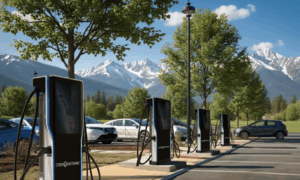
Home / EV Charging News / The Role of AI in Optimizing Electric Car Charging: How artificial intelligence algorithms can be utilized to optimize charging patterns, reduce costs, and improve overall efficiency
As the world embraces electric vehicles (EVs) as a sustainable transportation solution, the need for efficient and effective charging infrastructure has become paramount. Traditional electric car charging methods involve plugging in the vehicle and waiting for the battery to reach the desired level. However, with the advancements in artificial intelligence (AI), we now have the ability to optimize charging patterns, reduce costs, and improve overall efficiency. This article delves into the role of AI algorithms in revolutionizing the way we charge electric vehicles.
To grasp the significance of AI in electric car charging, it’s crucial to comprehend the challenges associated with traditional charging approaches. The increasing demand for efficient charging solutions has led to the development of advanced AI-powered systems that tackle these challenges head-on.
While the potential of AI in optimizing electric car charging is immense, certain challenges and considerations need to be addressed:
The integration of AI algorithms into electric vehicle charging systems holds tremendous promise for optimizing charging patterns, reducing costs, and improving overall efficiency. As technology advances and collaborative efforts among industry stakeholders continue, we can look forward to a smarter, greener, and more sustainable charging network. With the potential to significantly enhance the user experience, drive down costs, and contribute to environmental sustainability, AI is set to revolutionize the way we charge electric vehicles and pave the way for a future of efficient and sustainable transportation.



